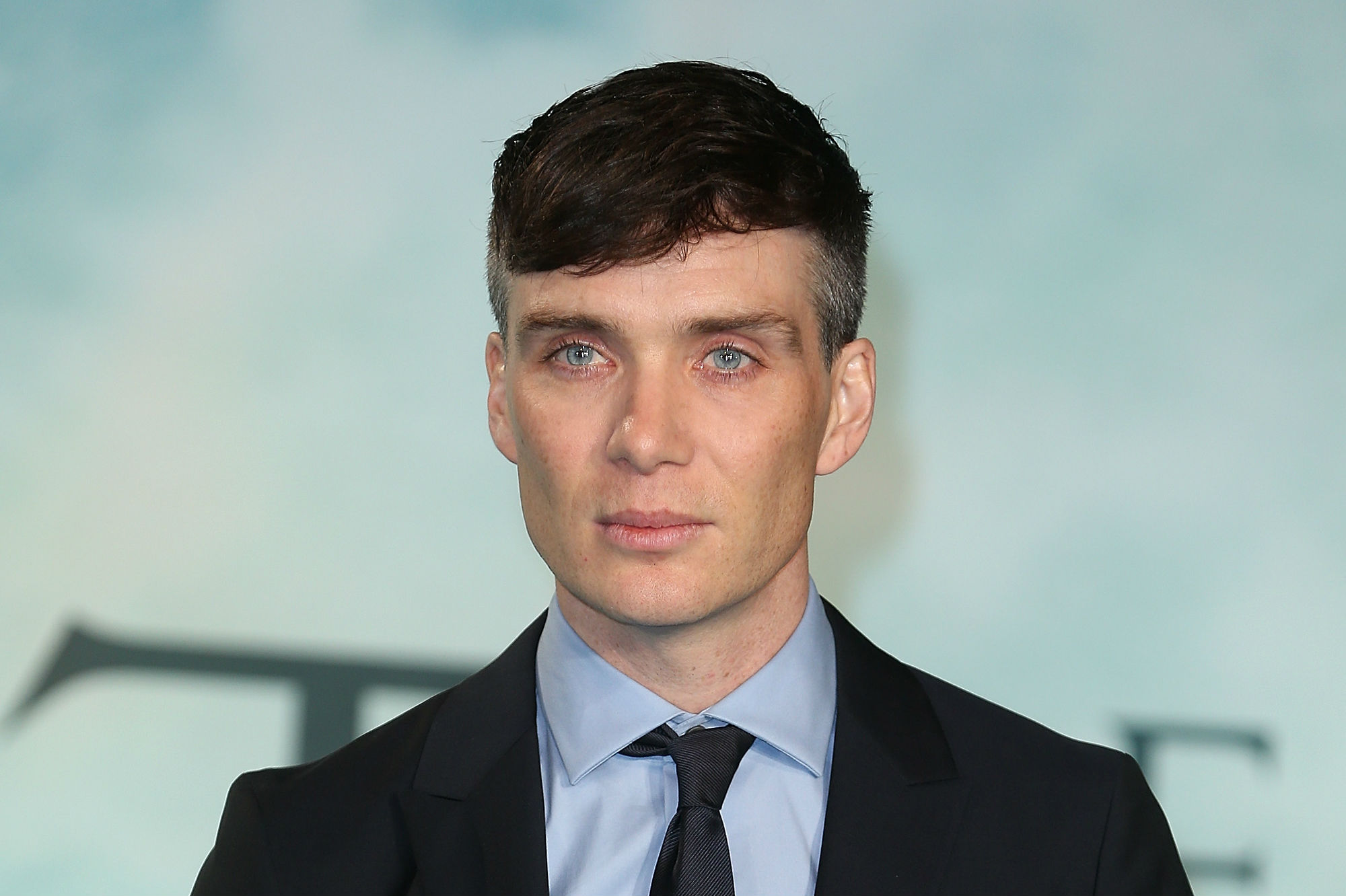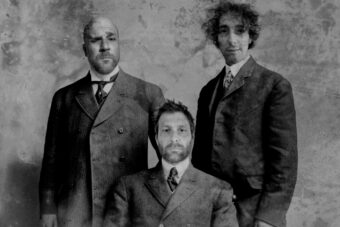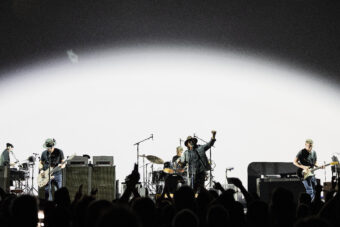“On a gathering storm / Comes a tall handsome man / With a dusty black coat / And a red right hand”: Nick Cave and the Bad Seeds’ 1994 song “Red Right Hand” could have been written about Tommy Shelby, Cillian Murphy’s character on the BBC-produced crime drama Peaky Blinders. The steely-eyed scion of the titular criminal gang — ahem, family business — in 1920s Birmingham, England, Tommy is tireless, cunning, and ruthless. It’s far from the Irish actor’s first damaged, conflicted character: He played the Scarecrow in Christopher Nolan’s Dark Knight trilogy, the survivor of a zombie apocalypse in 2002’s 28 Days Later, and an early IRA rebel in the 2006 drama The Wind That Shakes the Barley.
Blinders is not the typical BBC period drama (fewer teacups, more knives). After Murphy’s performance, its most memorable feature might be its soundtrack: contemporary rock’n’roll, much of it blues-inspired, with a particular affinity for the White Stripes, PJ Harvey, and Arctic Monkeys. The show’s third season, recently made available on Netflix in the U.S., finds the Shelby family battling to control a criminal empire that’s ballooned from illegal bookmaking to international arms dealing. And the musical stakes have risen too: Season three is the first to feature Radiohead, and, by request of the late Starman himself, a song by David Bowie.
Murphy, 40, already enjoyed artists like Nick Cave and Jack White, but he says he was surprised to find them a perfect fit for interwar mobsters. An avid music fan, Murphy has also popped up in the music video for Feist’s “The Water” and directed a clip for the English band Money. He started out as a musician himself, performing in a Frank Zappa-inspired rock band called Sons of Mr. Greengenes with his younger brother. Only just out of secondary school, he opted to pursue acting after turning down a record deal. SPIN recently reached Murphy over the phone in Ireland to talk Peaky Blinders, A Moon Shaped Pool, and meeting David Bowie.
It was a while ago now, but you originally aspired to be a rock star. Who offered you the record deal that you ultimately turned down?
It was a label called Acid Jazz in London. The main impediment to us signing was that we were all quite young. We had left school, but my brother was still in school, and my parents were not going to let him sign a record deal when he was, like, 16. And also it wasn’t a very forgiving record deal, if you know what I mean. Just at the exact same time as we got offered the record deal I discovered theater, so that’s what happened, really.
I’ve read that you weren’t thrilled, at first, when you found out that the creators of Peaky Blinders wanted to use contemporary music in the show.
Originally I thought it was a terrible idea, because I’d seen it attempted before and seen it not succeed. But for some reason, the energy of the show and the impulse of the show suited that type of music. And I think that it was a very specific type of music — like using Nick Cave a lot, and blues-orientated music — [that] helped the outlaw feel of the show. If we had been using more middle-of-the-road pop music it wouldn’t have worked, but it just clicked. I mean, as soon as we put “Red Right Hand” against a picture it just clicked, so I was wrong.
Is it true that David Bowie requested that his music be used in the show?
Yeah, and I was very fortunate to meet and to talk to him. He was a fan, you know, and it’s very bittersweet for me — being such a huge fan of his music, and then losing him, and then having it on the show. It’s beautiful but very heartbreaking at the same time.
It’s a little bit unusual for an actor to have direct input with the soundtrack, but you have.
Yeah, I’ve been part of the show for a long time now — it’s three or four years, and I’m an executive producer credit on it this year. You actually become involved in something [when] it takes up half of your year, every year. I’m very close with Steven Knight, the creator, and I’m very close with Caryn Mandabach, the producer. So inevitably it becomes like a collective, collaborative effort.
It’s interesting that not only is so much of Peaky Blinders’ music contemporary, but a lot of it is American, because to the characters, America is almost as foreign as rock’n’roll is.
I think perhaps in the first series there was a more American influence. I think in the second and third there was quite a lot of British, and in the second series PJ Harvey was kind of our main artist. We were very lucky to have Flood, who’s an incredible producer, collaborate with her. What I love about that series is that we had a British female vocalist become the voice in such a male-dominated world. Then, if you look at the third series, you’ve got Radiohead and Bowie in there, so I think we’ve tried to keep it as British as possible. Inevitably when you get into that rock’n’roll thing, you know, you guys did it first and best. [Laughs.] So inevitably you’ve got to steal from that library sometimes.
About those two Radiohead songs — “You and Whose Army” and “Life In a Glass House.” Were those songs that you knew before the show?
I’m a huge Radiohead fan, have been since I was a teenager, so yeah, they’re amazing songs. The thing about Radiohead is they have such an incredible back catalog that to be given access to it — that’s a huge honor. I thought those two choices worked really, really well. You have to choose very carefully, but particularly “You and Whose Army” at the end of episode one was just — it was like it was written for the show. It was extraordinary.
What concerts have you gone to recently?
Well, it was very great to see Radiohead at the Roundhouse in London when they played there about, I don’t know, three weeks ago. That was pretty special.
What did you think of the new Radiohead album?
I think it’s just absolutely beautiful. I’ve been listening to it on repeat. I think we’ve lost the art of listening to albums these days. Everybody knows that, because it’s just buying a song here or there or just choosing a song on Spotify, wherever it may be. This just demands to be listened to as a whole. They pretty much played the whole record live from start to finish before they did the hits. It was amazing to watch it, and to feel the whole narrative or journey of the record. It was nice to be made to listen to an album in full like you’re supposed to do.
People are so passionate about that band like they are about very few other bands.
Yeah, I know. They deserve it. You only get a band like that every sort of generation, I think. They are that band.
Your character from Peaky Blinders, Tommy — if he could listen to music on his own time, would he?
No, see I think Tommy would have no time for music. I’ve said this before, myself and Tommy Shelby, he’s the most unlike-me character I have ever played. Some people play a character and you go, “Yeah, I can see that. There’s a bit of me in there. That guy, he’s like me except different.” But Tommy there’s just such a huge distance to travel for me. I don’t think he’s much of a reader or much of a music listener. An incredibly bright man, but I just don’t think the arts are necessarily his thing. I would imagine he wouldn’t be able to process how sitting down to listen to a record or sitting down to read a book would be a good use of time when he could be out making money or taking over some gang.
Are there songs you would like to see included before the show ends?
I’ve always thought a bit of Led Zeppelin would work in there, you know. You mentioned American rock’n’roll, but [Zeppelin is] kind of taking American blues music and putting it through this prism of British power rock. I think it would work great with the show. Hopefully Jimmy Page is a fan.





